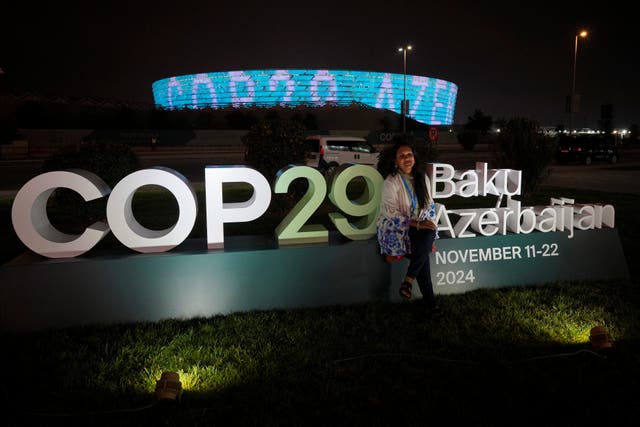
Countries have made “minimal progress” in increasing action to curb global warming in the past three years, analysis shows.
An assessment by the Climate Action Tracker (CAT) initiative says that current policies by governments put the world on track for an estimated 2.7C of long-term warming.
That is the same as it was three years ago when governments gathered at the UN Cop26 climate talks in Glasgow hammered out a deal that was intended to keep the target to limit warming to 1.5C above pre-industrial levels alive.
Even as the climate crisis worsens, with the world on track for a new record hot year with temperatures temporarily at least above the 1.5C, and increasing numbers of devastating extreme weather events, action to tackle the issue has stagnated, CAT said.
But its analysis suggests the re-election in the US of Donald Trump, who is expected to curb environmental action domestically and pull out of the global Paris climate treaty, will make only a slight increase in warming projections.
The analysis, released as countries meet for the latest round of climate talks in Azerbaijan, finds that if current climate action pledges known as “nationally determined contributions” up to 2030 made under the Paris deal are delivered by countries, the world is still on track for 2.6C of warming.
That would come down to 2.1C if governments deliver on their pledges and binding long-term targets for climate action.
And under the most optimistic scenario which includes all announcements on cutting emissions to net zero, the world faces 1.9C of warming by the end of the century – a slightly worse outlook than the 1.8C in last year’s analysis.
The analysts warned that while renewable energy and electric vehicle deployment has seen record-breaking progress and energy investments in clean energy are now double those for fossil fuels, subsidies for oil, gas and coal remain at record high levels.
The positive impact of renewable energy is being offset by growth in fossil fuel subsidies which “continue to anchor fossil fuel use in the global economy”, the analysis warned.
And in terms of ambition, 2024 has been marked by minimal progress, with almost no new NDCs or net zero pledges.
Report lead author Sofia Gonzales-Zuniga of Climate Analytics, a CAT partner organisation, said: “We are clearly failing to bend the curve.
“As the world edges closer to these dangerous climate thresholds, the need for immediate, stronger action to reverse this trend becomes ever more urgent.”
She also warned the projection for current policies of 2.7C of warming was a median estimate with a 50% chance of being higher or lower, while the analysis says warming will continue to worsen past 2100 in all but the most optimistic scenarios.
The analysts have released recommended 2035 targets for the biggest emitters that would be in line with what is needed to keep temperatures to 1.5C of warming to avoid the worst impacts.
These require huge cuts in emissions from the likes of the US, China, the European Union and Japan, while developed countries need to back up domestic action with significant financial and other support for developing nations to help them shift to clean economies, they warned.

The impact of Mr Trump’s return to the White House has been calculated as adding 0.04C of warming if the rollback of climate policies is limited to the US.
But that could be higher if the US permanently abandoned targets to cut emissions to net zero, accompanied by more countries rolling back or delaying action.
Bill Hare, chief executive of Climate Analytics, said there was a “clean energy momentum in the US now that will be difficult to stop”.
“While the Trump administration will undoubtedly do its best to throw a wrecking ball into climate action, the clean energy momentum created by President Biden, being actioned across the country, is likely to continue at significant scale,” he said.
Climate Action Tracker is an analysis carried out in collaboration by two organisations, NewClimate Institute and Climate Analytics.


Why are you making commenting on The National only available to subscribers?
We know there are thousands of National readers who want to debate, argue and go back and forth in the comments section of our stories. We’ve got the most informed readers in Scotland, asking each other the big questions about the future of our country.
Unfortunately, though, these important debates are being spoiled by a vocal minority of trolls who aren’t really interested in the issues, try to derail the conversations, register under fake names, and post vile abuse.
So that’s why we’ve decided to make the ability to comment only available to our paying subscribers. That way, all the trolls who post abuse on our website will have to pay if they want to join the debate – and risk a permanent ban from the account that they subscribe with.
The conversation will go back to what it should be about – people who care passionately about the issues, but disagree constructively on what we should do about them. Let’s get that debate started!
Callum Baird, Editor of The National
Comments: Our rules
We want our comments to be a lively and valuable part of our community - a place where readers can debate and engage with the most important local issues. The ability to comment on our stories is a privilege, not a right, however, and that privilege may be withdrawn if it is abused or misused.
Please report any comments that break our rules.
Read the rules hereLast Updated:
Report this comment Cancel